Choosing the right canine companion for pheasant hunting is a decision that deeply impacts your experience in the field. Much like selecting the ideal shotgun, which William Harnden Foster, author of “New England Grouse Shooting,” eloquently described as “the one that a certain hunter will find most pleasant to carry…and there prove most efficient when the shot is made,” a pheasant dog should be defined by similar virtues. An ideal pheasant dog, by this logic, is one that a hunter finds most pleasant to follow to where a pheasant is to be found, and subsequently proves most efficient at producing it for the gun. While individual preferences for what constitutes “pleasant” and “efficient” vary widely, the following ten breeds stand out as exceptional choices, each bringing unique strengths to the pursuit of pheasants. This guide will help you understand their distinct attributes, aiding you in selecting the Best Dog Breed For Pheasant Hunting that perfectly aligns with your style and needs.
Wirehaired Pointing Griffon
Often lauded as “the four-wheel drive truck of the bird dog fleet,” the Wirehaired Pointing Griffon is a rugged and tenacious hunting dog, perfectly suited for the demanding conditions of pheasant hunting. Greg Septon, a devoted Griffon enthusiast from Muskego, Wisconsin, attests to their unparalleled ability to root out pheasants from dense, heavy cover without giving up. While they may not possess the flashy style of some other pointing breeds, their unwavering determination consistently puts birds in the bag.
Beyond their formidable hunting capabilities, Griffons are deeply devoted companions. They thrive as part of a human family and can languish if confined solely to a kennel. Known for their playful and sometimes comical nature, they are experts at getting your attention, whether by bringing a dirty sock or a pair of underwear from the laundry room. Their affectionate and remarkably patient temperament makes them excellent partners both in the field and at home. Septon recalls hunting prairie chickens with his Griffon, Briar, who would sit patiently for over an hour, just watching and waiting. An added bonus, according to Septon, is their excellent car manners, making them ideal travel companions for hunting trips. These traits make the Wirehaired Pointing Griffon a truly versatile and loving choice, also fitting the criteria for the best bird dog for family pet.
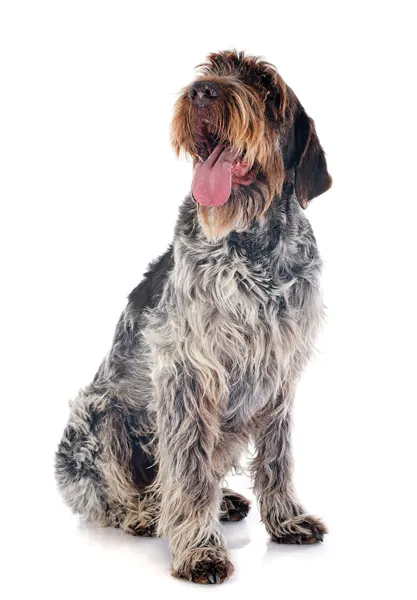 A Wirehaired Pointing Griffon with its distinctive shaggy coat, a top pheasant hunting dog breed, standing alert in a field..jpg.aspx)
A Wirehaired Pointing Griffon with its distinctive shaggy coat, a top pheasant hunting dog breed, standing alert in a field..jpg.aspx)
German Shorthaired Pointer
The German Shorthaired Pointer (GSP) embodies the philosophy that “in the middle is best,” a phrase that aptly describes its balanced approach to bird hunting. The GSP isn’t the fastest dog, nor the slowest; it doesn’t range the widest, but it isn’t a close-worker only. It strikes a remarkable balance in nearly every facet of its performance, making it the “happy medium” of bird dogs. This versatility is a key factor in its enduring popularity among pheasant hunters.
What truly sets the GSP apart, in many hunters’ experience, is its low-maintenance nature. Once a German Shorthair masters its craft, it rarely backslides. A good GSP is often compared to a reliable car: no matter how long it sits in the garage, it starts right up when you turn the key. This dependable, consistent performance, coupled with its balanced attributes, makes the GSP a standout choice for those seeking a highly effective and fuss-free pheasant hunting dog.
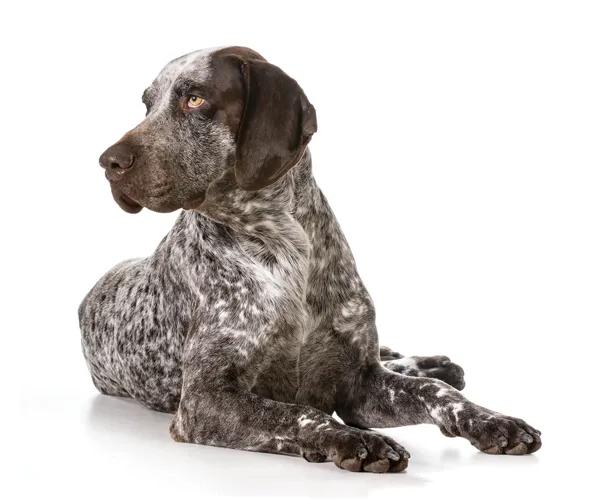 A majestic German Shorthaired Pointer, a versatile pheasant hunting dog, with a focused expression in a natural outdoor setting.
A majestic German Shorthaired Pointer, a versatile pheasant hunting dog, with a focused expression in a natural outdoor setting.
English Cocker Spaniel
When a dog “gets birdy,” every fiber of its being typically goes into overdrive. For English Cocker Spaniels, “overdrive” is their default setting. These canine dynamos approach pheasant hunting with an explosive energy that is thrilling to witness. Following an English Cocker in the field is like trailing a live grenade—intense and exhilarating. This breed delivers an excitement level unmatched by many other flushers or pointers.
Do not be fooled by their compact size; English Cockers are formidable in heavy cover. Anecdotes from experienced trainers like Tom Ness, a top cocker breeder and trainer, highlight their incredible ability to shred through cattail marshes, brush-choked shelterbelts, and plum thickets. Their body language, as they work, seems to shout a challenge to the toughest terrain. Aptly dubbed “little big dogs,” they defy expectations, proving that their small stature belies immense power and determination. It’s truly difficult to find a fault with these remarkable pheasant hunting dogs.
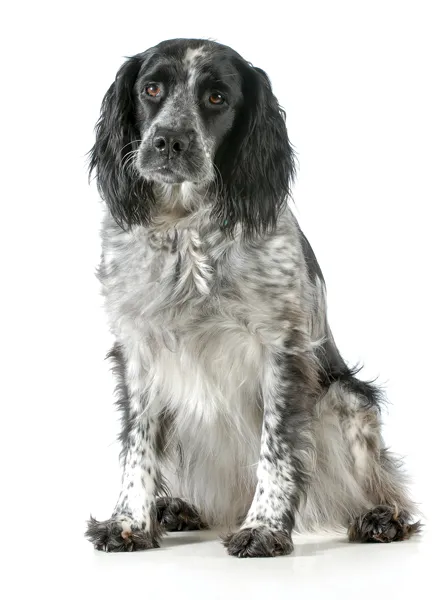 An energetic English Cocker Spaniel, known for its flushing prowess, in a dynamic pose during a pheasant hunt.
An energetic English Cocker Spaniel, known for its flushing prowess, in a dynamic pose during a pheasant hunt.
Golden Retriever
The Golden Retriever, one of the “Big Three” retriever breeds, is uniquely distinguished by a significant portion of its design and engineering being devoted to upland work. While widely recognized for their retrieving capabilities, many goldens used for hunting are primarily (if not exclusively) pheasant dogs. This natural aptitude for flushing pheasants is deeply ingrained in their lineage, with their family tree including rootstock from setter-spaniel clans.
One memorable instance, captured in a viral video, shows a Golden Retriever incredibly scaling a tree limb to retrieve a wounded rooster, demonstrating their inherent drive and capability. However, the breed’s immense popularity has unfortunately led to a watering down of the gene pool in some lines. For serious hunters, it is vitally important to source a pup from proven field lines. Generally speaking, avoid Goldens that look like they belong in a Beverly Hills mansion; instead, seek out their country cousins, bred for their working prowess rather than show ring aesthetics. For those interested in diverse coat colors in hunting dogs, you might explore black and white hunting dog breeds.
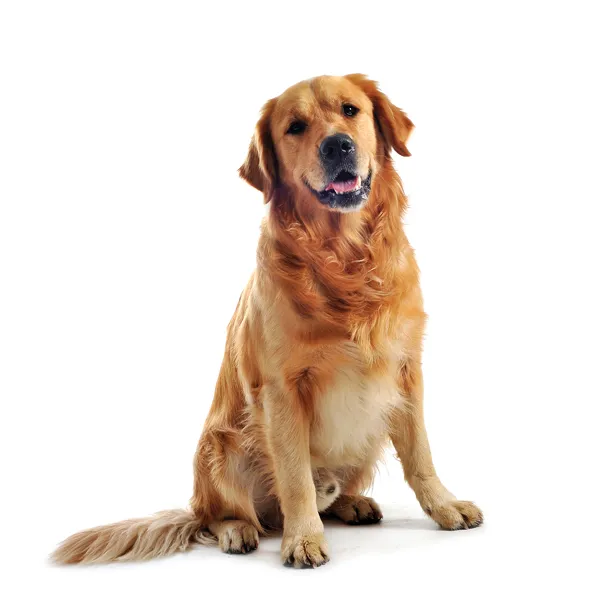 A beautiful Golden Retriever, a popular choice for pheasant hunting and retrieving, alertly observing its surroundings in a field.
A beautiful Golden Retriever, a popular choice for pheasant hunting and retrieving, alertly observing its surroundings in a field.
Deutsch Drahthaar / German Wirehaired Pointer
Referred to affectionately as “The Bearded Ones,” Deutsch Drahthaars and German Wirehaired Pointers are distinct yet closely related breeds, sharing many similar characteristics. These dogs are the epitome of efficiency in the pheasant field. Lynda Krull of Harrold, South Dakota, whose Drahthaars are considered a benchmark for pheasant dog performance, highlights their combination of surgical precision and Special Forces-like relentlessness.
It is a rare rooster that can outsmart these intelligent hunters, and any bird that falls is as good as in the bag, with cripples almost never lost. Lynda describes the enjoyment of watching her Drahthaars work as a “ballet—a beautiful and intricate dance.” They utilize their noses, ears, eyes, and intelligence, but most importantly, their hearts. Their passion for partnership is evident, making every successful retrieve a shared victory. This profound dedication and remarkable efficacy make them premier choices among pheasant hunting dog breeds.
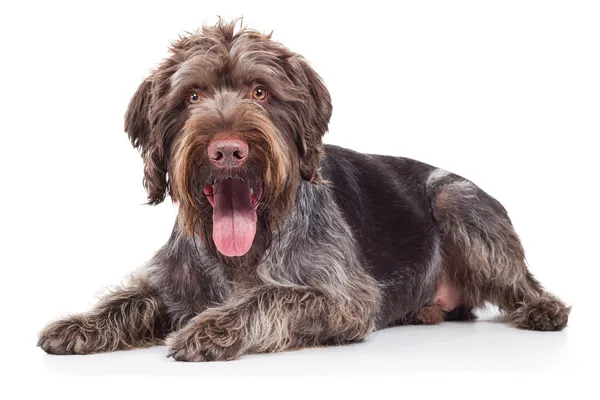 A Deutsch Drahthaar (German Wirehaired Pointer) showcasing its distinctive beard and rugged coat, a highly efficient pheasant hunting dog.
A Deutsch Drahthaar (German Wirehaired Pointer) showcasing its distinctive beard and rugged coat, a highly efficient pheasant hunting dog.
Labrador Retriever
The Labrador Retriever consistently tops the checklist of desirable qualities in a hunting dog, making it an incredibly versatile and reliable choice for pheasant hunting. Their intelligence, trainability, and eagerness to please are paramount. Combine this with a high prey drive, a weather-resistant and low-maintenance coat, and a willingness to bust through heavy cover, and you have a nearly perfect flushing-retrieving machine. Their rugged athleticism and robust conformation ensure they are built for demanding field work.
A Lab epitomizes versatility. If you desire a dog that can effectively hunt pheasants with minimal specialized training—a “right out of the box” performer—the Lab is an excellent fit. They excel not only at flushing roosters but are even more exceptional at retrieving downed birds. As eminent outdoor writer and editor Steve Smith once stated, “If I needed to kill a pheasant to feed my family, the dog I’d want would be a flushing Lab.” This speaks volumes about their dependability and effectiveness in the pheasant field.
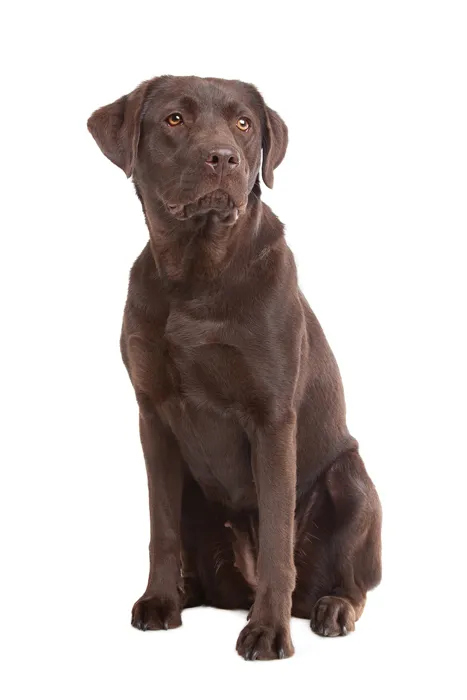 A classic Labrador Retriever, a versatile and eager flushing-retrieving dog, ready for a pheasant hunt.
A classic Labrador Retriever, a versatile and eager flushing-retrieving dog, ready for a pheasant hunt.
Brittany
Charley Waterman, a revered outdoor writer, held a special place in his heart for upland bird hunting, particularly with his Brittany, Kelly. Waterman’s poignant tribute, “Going Up Under the Mountains,” vividly portrays Kelly’s unique approach to pheasant hunting, describing it as a hobby requiring a blend of trailing, pointing, stealth, and even a bit of flushing. Kelly’s methods were uniquely researched and perfected by the dog himself, often diverging from conventional dog-training manuals.
This “whatever works” philosophy is a hallmark of many Brittanys. As traditional companions of French poachers, Britts are pragmatic and dispense with ceremony in the field. Waterman recounts how Kelly, during his last pheasant hunt, employed a special trick: jumping high three times, startling a pheasant from 20 feet away. This anecdote highlights the breed’s intelligence, adaptability, and independent problem-solving skills, making them intuitive and effective pheasant hunting dogs that consistently find ways to put birds up.
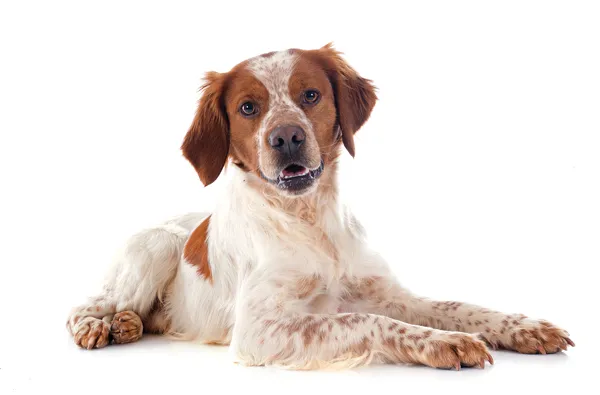 A keen Brittany Spaniel, an agile and intelligent pheasant hunting dog, intently scanning a field..jpg.aspx)
A keen Brittany Spaniel, an agile and intelligent pheasant hunting dog, intently scanning a field..jpg.aspx)
English Setter
The English Setter is a breed of striking beauty and incredible field versatility, yet it is arguably the most challenging gun dog breed to generalize about. While many breeds exhibit a split between field and show lines, the English Setter’s field lines alone are incredibly diverse. You might encounter a compact, 35-pound setter with sparse feathering next to a tall, silky-coated 70-pounder, with vastly different appearances and working styles.
Their field performance is equally varied, ranging from reckless horizon-busters to cautious close-workers, and everything in between. Therefore, anyone considering an English Setter must have a clear idea of the specific type of setter they are seeking. However, one universal truth about the breed is that a truly good one will “spoil you for any other breed.” Owners who have been blessed with exceptional English Setters, like Emmylou and Tina, speak of an unparalleled hunting partnership. While subtle differences exist between individuals, their consistent excellence in finding and pointing birds leaves a lasting impression, making them a captivating choice for the dedicated pheasant hunter.
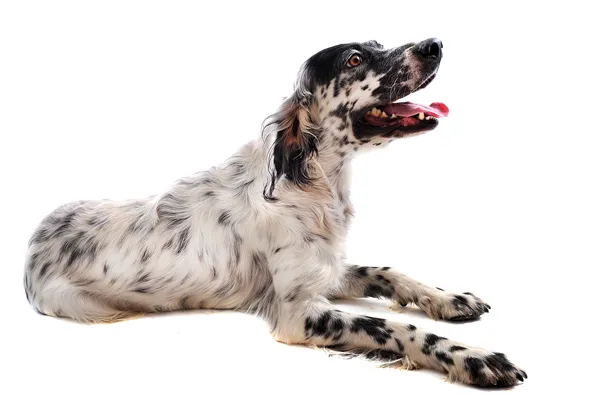 An elegant English Setter, a beautiful and effective bird dog for pheasant hunting, with a flowing coat.
An elegant English Setter, a beautiful and effective bird dog for pheasant hunting, with a flowing coat.
English Springer Spaniel
If the German Shorthaired Pointer holds the title of “happy medium” among pointing dogs, the English Springer Spaniel claims this role in the flushing dog division. Possessing less hyperkinetic energy than a Cocker Spaniel but more fire, flash, and dash than a Labrador or Golden Retriever, the Springer is an almost perfect blend of fun and functionality in the field.
It’s important to recognize the Springer’s historical significance as America’s original pheasant specialist. In the 1920s and ’30s, English, Irish, and Scottish gamekeepers brought their Springers to manage estates for pheasant shooting in the U.S., rapidly spreading the breed’s popularity. For much of the 20th century, the Springer was considered the pheasant dog par excellence. While increased competition means it no longer dominates the field as exclusively, the breed remains as proficient a pheasant-flusher as ever. A quote from Jeff Griffen’s 1964 book, “The Hunting Dogs of America,” beautifully sums it up: “If I lived north of the Mason-Dixon line and particularly liked to hunt pheasants but also went for grouse, woodcock and even ducks a few times during the season, I would never be without a well-trained Springer Spaniel. He’s just about the finest sporting dog for upland game on the American scene today…” Though times and tastes may evolve, the Springer’s enduring capabilities make it an undeniable contender for the best dog breed for pheasant hunting. You might also want to look for american basset hound puppies for sale if you’re exploring other hunting companions.
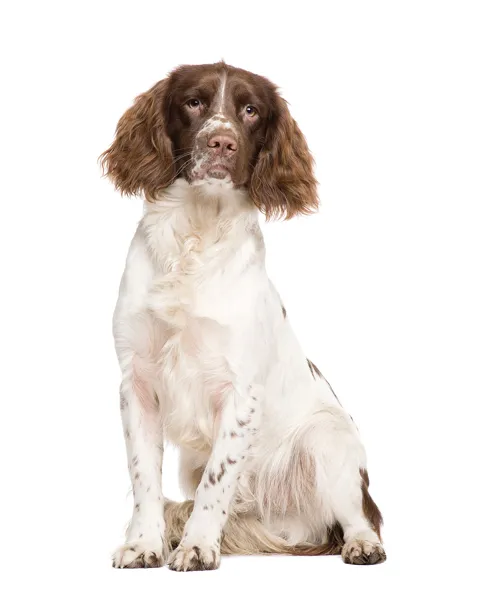 A vibrant English Springer Spaniel, known for its energetic flushing in pheasant fields, with its distinctive markings.
A vibrant English Springer Spaniel, known for its energetic flushing in pheasant fields, with its distinctive markings.
Vizsla
Despite feeling like a long-established presence in North America, the Vizsla didn’t make its American debut until 1950, when a diplomat sent a pair from Rome to Kansas City. These “yellow pointers,” as they were described in medieval Hungarian texts, were prized for centuries by the aristocracy, who meticulously controlled their breeding. This close control ensured an exceptionally high standard for the breed, though it also meant the small population faced near extinction during the World Wars.
Thankfully, the breed survived, and early American importations primarily stemmed from Czech and Austrian stock. The Vizsla is a brainy, biddable, and stylish pointing dog with an aura of refined elegance befitting its aristocratic heritage. They are eager to please and remarkably easy on the eyes, making them a superb choice for the sportsman who desires a sophisticated yet effective pheasant hunting dog. For those specifically seeking basset hound puppies for sale price, different considerations might apply.
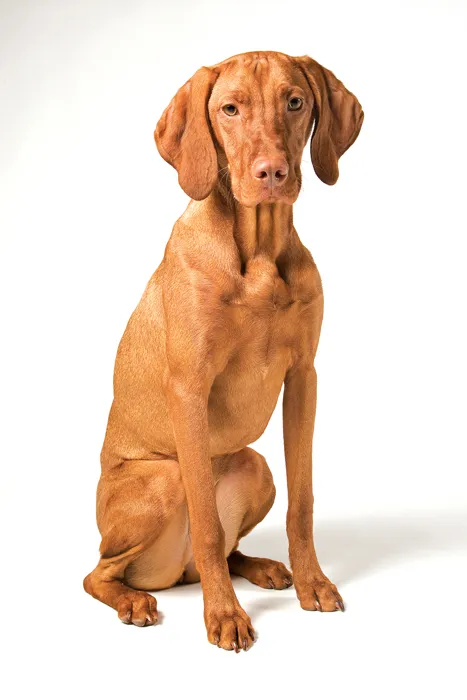 A sleek Vizsla, an aristocratic and keen pointing dog, standing gracefully in a sunny outdoor setting, ideal for pheasant hunting.
A sleek Vizsla, an aristocratic and keen pointing dog, standing gracefully in a sunny outdoor setting, ideal for pheasant hunting.
Conclusion
Selecting the best dog breed for pheasant hunting is a deeply personal choice, dependent on a hunter’s specific preferences, hunting style, and living situation. Each of the ten breeds discussed—from the tenacious Wirehaired Pointing Griffon to the elegant Vizsla—offers a unique blend of traits that make them exceptional in the pheasant field. Whether you prefer a hard-charging flusher or a meticulous pointer, a low-maintenance companion or a highly energetic dynamo, there is a breed perfectly suited to enhance your hunting adventures.
Ultimately, the most effective pheasant dog is one that you enjoy working with, one that understands your partnership, and one that consistently performs when it matters most. Carefully consider each breed’s characteristics, temperament, and hunting style to find the perfect four-legged partner to join you on your next pheasant hunt. Explore our other articles for more in-depth information on dog care and training to prepare your chosen companion for a lifetime of rewarding experiences in the field.
References
- Davis, T. (n.d.). Best Dog Breeds for Pheasant Hunting. Original story text.
- Pheasants Forever. (n.d.). Images sourced from www.pheasantsforever.org and www.shutterstock.com, provided in the original article.
- Foster, W. H. (1941). New England Grouse Shooting. Charles Scribner’s Sons.
